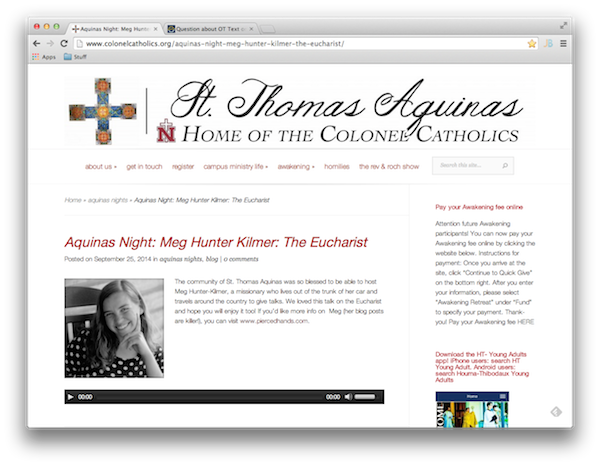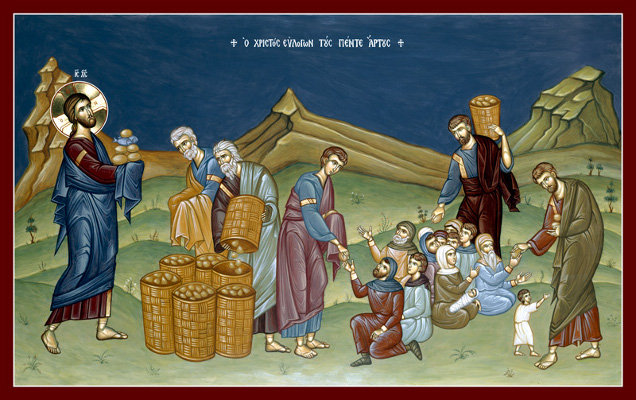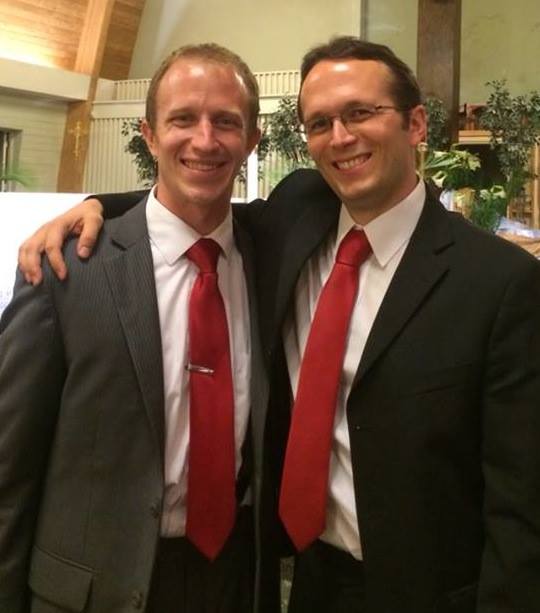Meg on the Eucharist
A while back, Meg came and spoke at the Goretti Group. I’ll be sharing the video next week, but in the meantime here’s a talk she gave on the Eucharist:

"We are travellers…not yet in our native land" – St. Augustine
A while back, Meg came and spoke at the Goretti Group. I’ll be sharing the video next week, but in the meantime here’s a talk she gave on the Eucharist:


Reception of the Holy Eucharist has recently been the subject of scrutiny in the media, prompted by some of the discussions taking place in the “Synod on the Family”. In my own life, Holy Communion was also the subject of a recent incident concerning a friend of mine.
You see, a friend recently went to a Catholic conference together with a Protestant. Being a Catholic event, there was, of course, the celebration of the Eucharist. When time for Mass came, the non-Catholic was upset that she couldn’t go up to receive the Eucharist. She couldn’t do this because, under ordinary circumstances, the Catholic Church does not allow non-Catholics to receive Holy Communion.
“…members of those churches with whom we are not yet fully united are ordinarily not admitted to Communion”
– United States Conference of Catholic Bishops, “Guidelines For communion”
In this post I would like to provide a summary of what I say when I’m asked why it is that the Catholic Church doesn’t allow anyone to receive Holy Communion (the Eastern Orthodox Churches have similar rules for similar reasons). As usual, this won’t be an exhaustive theological explanation, simply a rough outline of the kind of thing I personally say when I’m asked to explain this particular Catholic teaching.

There’s a lot of discussion online at the moment about the conditions under which people may or may not receive communion. I have another post in draft on this subject, but I wanted to do a quick post outlining some of the earliest Church testimony on this subject.
In the First Century, the Didache teaches the following:
“On the Lord’s day, gather yourselves together and break bread, give thanks, but first confess your sins so that your sacrifice may be pure. However, let no one who is at odds with his brother come together with you, until he has reconciled, so that your sacrifice may not be profaned.” – Didache (Chapter 14)
So here we see that unrepentant sin or in a state of disunity cannot receive communion. We find Justin Martyr in the Second Century saying something very similar:
“This food we call Eukaristia [the Eucharist], and no one is allowed to partake but he who believes that our doctrines are true, who has been washed with the washing for the remission of sins and rebirth, and who is living as Christ has enjoined” – St. Justin Martyr, First Apology (Chapter 66)
Here we find the three basic conditions to receiving communion: baptized, assent to Church doctrine and right living.

I’ve got a more substantial post in the works on the subject of interdenominational communion which I’ll publish next week…
The difference is obviously 1,000! However, there’s another importance difference and I’d like to take a look at that today…

 Today’s song for Music Monday is “Panis Angelicus”, sung by Andrea Bocelli. This was a song I immediately fell in love with…but it was at a time when I was becoming increasingly anti-Catholic in my beliefs, so I responded with horror when I realized what the lyrics meant when translated from Latin. Still, even back then I couldn’t help but love it…
Today’s song for Music Monday is “Panis Angelicus”, sung by Andrea Bocelli. This was a song I immediately fell in love with…but it was at a time when I was becoming increasingly anti-Catholic in my beliefs, so I responded with horror when I realized what the lyrics meant when translated from Latin. Still, even back then I couldn’t help but love it…
Panis angelicus
(Bread of the Angels)
fit panis hominum;
(Is made bread for mankind)
Dat panis cœlicus
(Gifted bread of Heaven)
figuris terminum:
(Of all imaginings the end;)
O res mirabilis!
(Oh, thing miraculous!)
Manducat Dominum
(This body of God will nourish)
Pauper, servus et humilis
(the poor, the servile, and the humble)
Around the country there have been quite a few reports that this has been an incredibly fruitful year for Catholicism, with large numbers of people entering the Church. In the San Diego Diocese alone, we had 1,342 people join this Easter. One of them was a housemate of mine, Nathan:

Nathan is an richly gifted guy and, like his confirmation Saint, Ambrose, he is going to be a real asset to the Church and a real force for good in the Kingdom. Please say a prayer for him and, if you meet him in person, give him a high-five 🙂